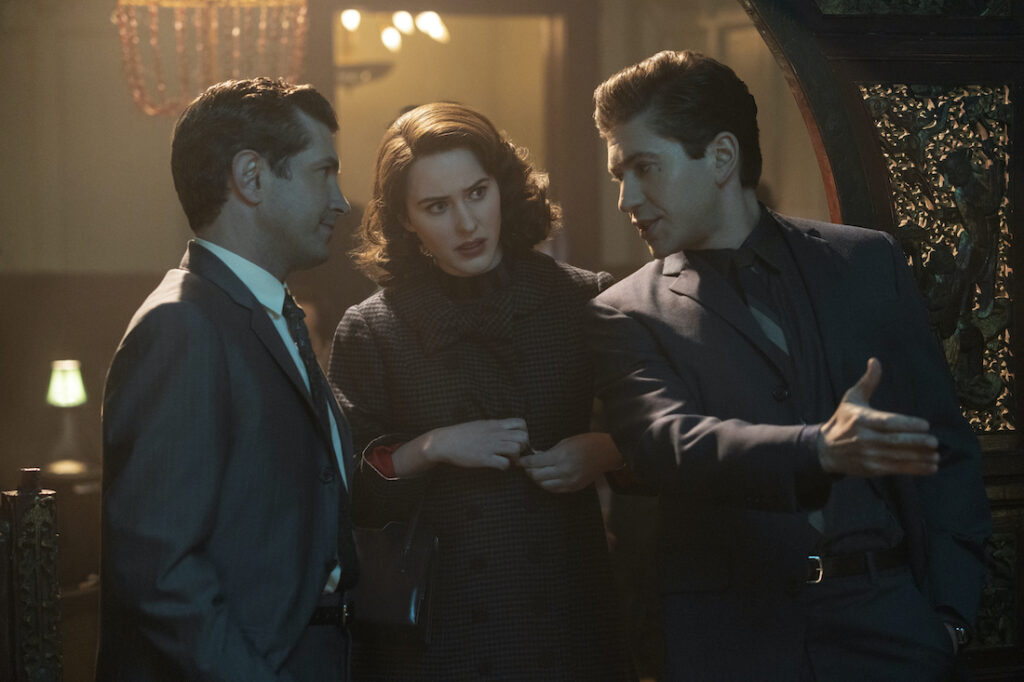The first episode of the fifth season of “The Marvelous Mrs. Maisel” is packed with all the stylistic choices that have endeared and alienated viewers of the Emmy-winning juggernaut. Yes, there are beautiful crops and costumes—including a discussion of Midge’s (Rachel Brosnahan) penchant for hats. There’s a lot of fast-talking, with one of those famous ensemble moments where it seems like everyone is speaking at once. And the art direction shines as always—as with an airport sequence, a mob-run trade show, and a visit back to Bryn Mawr featuring the underused Sarah Steele.
That first episode is also full of the characters and guest appearances defining the series. Luke Kirby reprises his role as Lenny Bruce, the show’s creator Amy Sherman-Palladino unable to go a season without him. Hot off her Oscar nomination, Stephanie Hsu plays Mei, proving that if Joel (Michael Zegen) is good at nothing else, he knows how to pick them. As always, Midge’s parents Rose (Marin Hinkle) and Abe (Tony Shalhoub), come close to stealing the show before giving the screen to their younger counterparts. And Alex Borstein as Susie Myerson is a delightful mix of rough edges and vulnerability.
Although the show never abandons its twee style, it thankfully stops being the focus. As Midge and company settle into their lives in apartments, offices, and comedy clubs, there’s less design to show off and more of the quotidian, if “Mad Men”-esque, workplace aesthetic.

This fifth season shows Midge struggling, which is something we haven’t seen before. Not because she is too pretty, intelligent, funny, or brave like in seasons past. But because she is trying to do something hard, something that may finally test the limits of her ability: work in television.
Midge gets a job in the writer’s room of the top-rated late-night show, a fictional “Gordon Ford Show,” filmed at NBC’s 30 Rock. Like Peggy before, Midge is the only woman in that particular role and is regularly referred to as the show’s “lady writer.” Still doing standup at night, Midge jokes about how offended she is that none of the men hit on her—until one does, which complicates her job. She befriends the secretaries and leaps at professional opportunities (spectacularly squandering one at sea) but truly struggles to shine in a business and institution that will not simply bend to her charm.
But fear not, Midge-fans, our supremely talented heroine does indeed succeed in achieving wealth and stardom. We experience her success as many episodes open with scenes decades ahead of the 1950s and 1960s Midge we’re used to watching. In these flashforwards, we get segments from the point of view of each of Midge’s kids, all grown up. It turns out that being marvelously self-absorbed does not yield great relationships with your children. We also see some of Midge’s romantic foibles, including multiple failed marriages and her continued affection for Joel. And we see her professional success and learn of her awards, fame, and achievements.
But the show is smart in structuring the season around Midge’s central relationship—the one she has with Susie. Through this narrative device, we learn that while Susie took Midge to the heights of stardom, going to extreme lengths, both professionally and personally, the two eventually find themselves estranged, spending years not speaking to each other. The will-they-won’t-they of this season is not if Midge will make it or what man she picks next. It’s whether she’ll find a way back to Susie.
And that has been the greatest strength of “The Marvelous Mrs. Maisel”—under its protagonist’s impeccable hats and charmed life, it’s the story of workplace relationships, ambition, and female friendship. Watching Midge and Susie create trust, work through conflict, and build careers in showbiz together has been the glue for this often fluffy show. It’s their relationship I will miss the most.
All of season five was screened for review. The final season of The Marvelous Mrs. Maisel premieres on April 14th on Prime Video.












